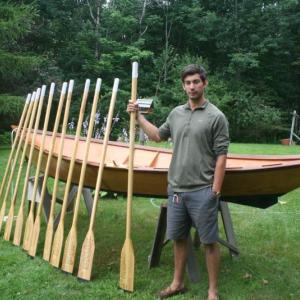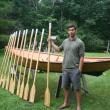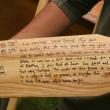A journey inscribed in blades
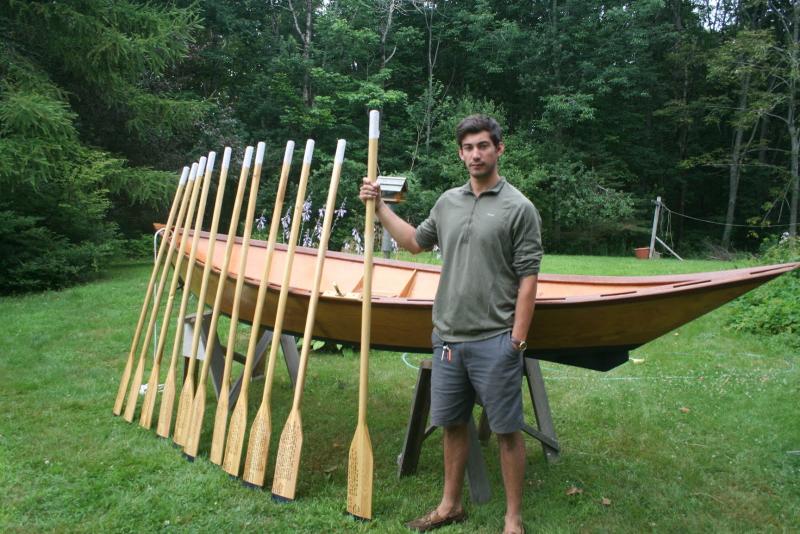 On oars he carved, Karl Berger tracked the time, date, coordinates and his thoughts and impressions of his 100-mile journey down the Columbia River in a boat he built. Below: one of the 20 inscribed oars. JOHN MAGUIRE/Boothbay Register
On oars he carved, Karl Berger tracked the time, date, coordinates and his thoughts and impressions of his 100-mile journey down the Columbia River in a boat he built. Below: one of the 20 inscribed oars. JOHN MAGUIRE/Boothbay Register
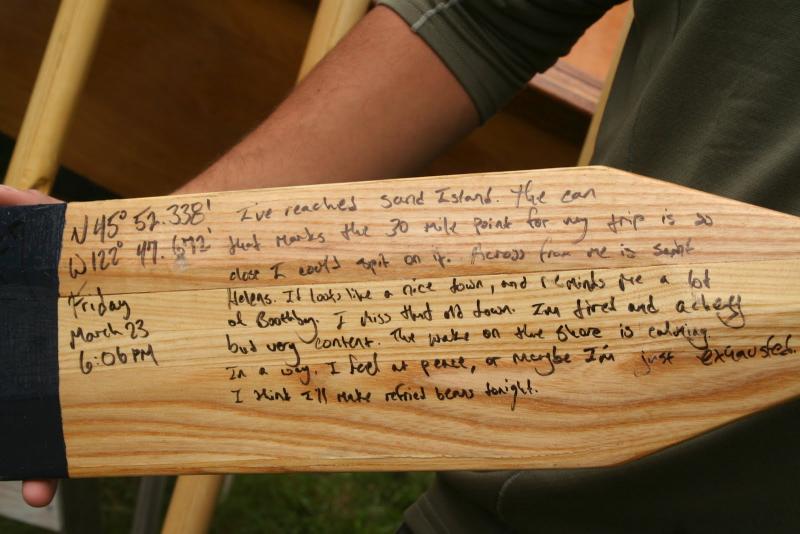 On oars he carved, Karl Berger tracked the time, date, coordinates and his thoughts and impressions of his 100-mile journey down the Columbia River in a boat he built. JOHN MAGUIRE/Boothbay Register
On oars he carved, Karl Berger tracked the time, date, coordinates and his thoughts and impressions of his 100-mile journey down the Columbia River in a boat he built. JOHN MAGUIRE/Boothbay Register
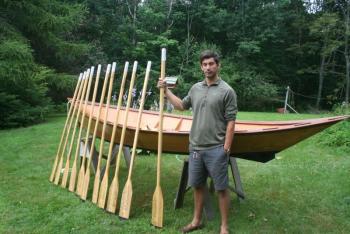 On oars he carved, Karl Berger tracked the time, date, coordinates and his thoughts and impressions of his 100-mile journey down the Columbia River in a boat he built. Below: one of the 20 inscribed oars. JOHN MAGUIRE/Boothbay Register
On oars he carved, Karl Berger tracked the time, date, coordinates and his thoughts and impressions of his 100-mile journey down the Columbia River in a boat he built. Below: one of the 20 inscribed oars. JOHN MAGUIRE/Boothbay Register
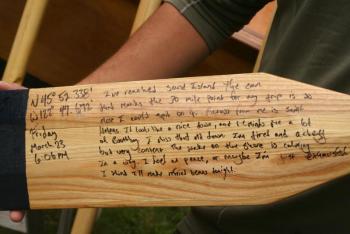 On oars he carved, Karl Berger tracked the time, date, coordinates and his thoughts and impressions of his 100-mile journey down the Columbia River in a boat he built. JOHN MAGUIRE/Boothbay Register
On oars he carved, Karl Berger tracked the time, date, coordinates and his thoughts and impressions of his 100-mile journey down the Columbia River in a boat he built. JOHN MAGUIRE/Boothbay Register
We often don't know where we are going, but our past follows us and influences our actions. Boothbay region native Karl Berger discovered this on completion of his final college project some 3,000 miles from home.
In a boat he made, using oars he crafted, Berger rowed 100 miles down the Columbia River in Oregon. Every five miles of his journey, Berger wrote down his impressions, thoughts and experiences, not in a notebook, but on each of his 20 oars.
For his final year as an undergraduate in studio art at Lewis and Clark College in Portland, Ore., he needed to complete a final project. Starting out, Berger did not know what he wanted to make.
“I knew I was going to make something in wood. I knew it would be nautical in nature,” Berger said.
In a publication for Lewis and Clark College, renowned American art critic Peter Plagens is quoted as saying that Berger's was “The strongest undergraduate exhibition I've seen in a long time.”
Berger grew up in Boothbay Harbor and worked with his father Steve Berger in house construction and design for the Knickerbocker Group. This experience in woodworking and his life growing up on the coast provided a source for inspiration.
It took a year to build the boat, make the oars and prepare for his trip. The 16-foot dory he made was constructed of a plywood hull and mahogany gunwale. All of the oars were made of white ash.
He rowed down two rivers to travel from Portland to Astoria, where he met up with friends who drove his pickup truck. Berger made his way down the Willamette River, which merges onto the Columbia River. He said the trip took three days. Equipped with camping gear, radio, flares and other supplies, Berger spent days traveling on the water and nights sleeping along the shore in a tent.
By dividing the journey into 20 segments, Berger was able to stop and catalog his experiences onto the blade of each oar. When he was finished writing, he would retire the oar and exchange it for another.
“I've reached Sand Island,” he wrote. “Across from me is Saint Helens. It looks like a nice town and reminds me of Boothbay. I miss that old town. I'm tired and achy, but very content. In a way I feel at peace, or maybe I'm just exhausted.”
The experience left him with the sensation that he had walked a line between the seriousness and silliness of life. How to travel alone by boat, even as some people watched him pass on shore, was both a lesson in self-reliance and the desire to interact with fellow human beings.
He interprets the journey as a metaphor for traveling through life: often it seemed like he was rowing blindly, with his back toward his destination, and yet could see the landscape as it passed by. At times it took all his strength to keep the boat afloat in rough, choppy waves and to push ahead in still waters.
He started out on this journey to prove he could do it, but realized he wanted to share his experience with others along the way.
Address
United States

